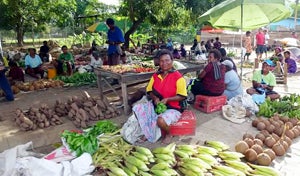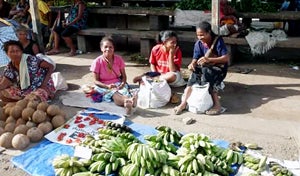Breaking the vicious circle of violence in local markets in Papua New Guinea
Date:
Doris John sells vegetables, mostly, pawpaw and eggplants at the Gordons Market in Port Moresby, Papua New Guinea. This is how she makes her living since she abandoned an abusive husband. She left behind a violent relationship, only to confront a different form of violence in her workplace.

“After our sales, some people followed us and were trying to pull our bags, says Shirley Miria, a local market vendor. “Sometimes when people are drunk they stand in your way and you have to pay them before you go out.
On a fact-finding mission to the Pacific island-nation in March, UN Special Rapporteur on violence against women, Rashida Manjoo, said that violence against women is a pervasive phenomenon in the country.
About 80 per cent of Port Moresby's market vendors are women. Many are extremely poor and have survived diverse forms of gender-based violence. Most vulnerable are single mothers and widows, who are stigmatized and lack economic and social opportunities.
“My husband abandoned me when my child was 3 years old, says vendor Marry Pialaya. “Since then I survive from the market and pay the school fee for my children. I have no support.
But the city's markets are not only trading places that support small-scale economic activity. In the absence of alternative places to socialize, they have also become spaces for gambling and drinking, among other activities, raising security concerns for women who depend on the markets to earn a subsistence living. In recent years, there have been reports of increasing acts of violence against women who frequent these markets.
“The market is not really safe, says Janet Osi, a vendor at the Gerehu market. “At night there is no security. We leave our leftover vegetables and go. Then men come and cut open the bags and steal kaukau, potatoes, bananas and coconut. In the morning we come and see. We bring our complaints to the police station, but the police do not help us.
To reduce such insecurity and violence against women and girls in public spaces, UN Women's Safe City Port Moresby Programme, in partnership with the National Committee for the District Capital (NCDC), is working in Papua New Guinea to devise new approaches. These include a programme focused on markets as a key entry point for mobilizing women's leadership and citizens' rights and responsibilities. This initiative is a part of UN Women's Global Programme “Safe Cities Free of Violence against Women and Girls with five pilots launched in 2010 in Cairo, Kigali, New Delhi, Quito and Port Moresby.

As part of the initiative, UN Women carried out a study to gather and document qualitative and quantitative data on gender-based violence, as well as other forms of violence, taking place in six markets of Port Moresby. The results revealed that women suffer from extortion on a regular basis. Many women vendors are also displaced from the market shelters or market premises, and are forced to sit by busy roads or open sewage or trash sites to sell their fruits and vegetables, increasing their vulnerability. Often, mothers carry their children who wander around dirty places.
The study also indicated that sex trade and sexual exploitation, in particular of young women, is prevalent in all markets, especially where gambling and drinking occurs. There are insufficient spaces for vendors to sell their merchandise, which can lead to disputes. Storage facilities and toilets are inadequate, raising security and health concerns.
“After two years of implementation, the project has already produced results, says Anastasia Posadskaya-Vanderbeck, Manager of UN Women Safe Cities Global Initiatives. “It has mobilized and trained grassroots women and youth and sensitized relevant divisions of the local government and the judiciary in the areas of: gender, human rights, HIV prevention, working with men and boys to end violence against women, and community mobilization.
In consultation with the women and men market vendors at the pilot sites, the market by-laws which had been in existence since 1983 have been revised to ensure they are gender sensitive and incorporate issues of violence against women. New and accountable mechanisms for the collection of fees are being implemented at the markets, and infrastructure has been upgraded in the first pilot market, Gerehu, to ensure it is safe and inclusive.
“Markets that are safe for women will be safe for all, concludes Alethia Jimenez, the programme team leader in Papua New Guinea. “The Safe City Programme in Port Moresby invites all stakeholders to be part of this initiative.
Visit our In Focus section, which features a compilation of material related to Ending Violence against Women, including news and features, statements and speeches, videos and links.
Related stories:
- Safer spaces and better markets in the Pacific islands
- Winds of change: parliamentarians mobilize to end violence against women
Watch a video on the Safe Cities programme in Port Moresby, Papua New Guinea
